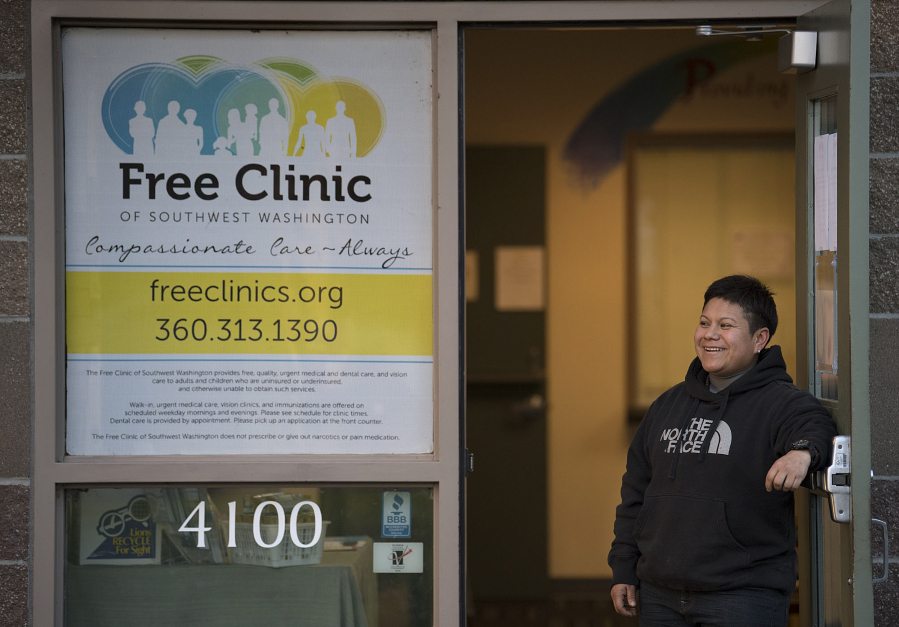Sandra Cruz knew something wasn’t right, but she never suspected cancer.
The 36-year-old Vancouver woman went to Sea Mar Community Health Center after several days of diarrhea. Cruz — a single mom working to support herself and her 11-year-old son — didn’t have health insurance, so she paid for the doctor’s appointment out of pocket.
When doctors referred her for an ultrasound, then a colonoscopy, Cruz set up payment plans to ease the financial burden. But when the tests revealed she had colon cancer, Cruz knew she couldn’t afford to pay for her medical care anymore.
That’s when Project Access stepped in.
Project Access is a program started in 2007 at the Free Clinic of Southwest Washington that connects low-income, uninsured Clark County residents with a coordinated system of specialty care and oral health services. In 2012, the program facilitated more than $5.8 million worth of care.
The services are donated by local providers, clinics and hospitals; grant money helps cover the administrative costs of the program. As of June, 272 specialty physicians and 21 dentists in Clark County were participating in the program.
“There wouldn’t be a Project Access if there wasn’t the support of the community,” said Kim Wolfe, Project Access program manager.
Patients are referred to the program by providers at the free clinic or other safety net clinics, such as Sea Mar, Battle Ground Healthcare and New Heights Clinic. From July 2015 to June 2016, providers referred 855 patients to the program.
To qualify for Project Access, patients must be between 18 and 64 years old, live in Vancouver and not have health insurance. In addition, the patient’s household income must be at or below 200 percent of the federal poverty level.
Referred patients who meet the criteria are connected with a patient care coordinator, who sets up appointments for services. The types of services vary from patient to patient and can range from lab work and X-rays to neurosurgery and cancer care.
Patients are enrolled in the program for six months, at the end of which they will be re-evaluated and either released from the program or enrolled for another six-month period.
The program currently has about 200 people enrolled. That number was much higher — about 500 to 600 patients enrolled at one time — before the Affordable Care Act, Wolfe said.
“I think Sandra is not every case, but since the ACA, the patients who come to us are more complex and need more care,” Wolfe said.
Every month or so they see someone in a similar situation, she said.
Despite health care reform, which expanded the Medicaid program and created tax credits to help people purchase individual health plans, Clark County still has an uninsured population. In Clark County, more than 38,000 people were uninsured in 2014 (the most recent data available), according to the state Office of the Insurance Commissioner.
Some patients don’t qualify for Medicaid but can’t afford to purchase a plan, even with the tax credit, Wolfe said.
Cruz tried to get insurance coverage but didn’t qualify. While she was able to pay for the ultrasound and colonoscopy on her own, she knew she couldn’t afford surgery and chemotherapy.
Cruz underwent her first surgery in February 2015, when surgeons removed about 4 inches of her colon. After the surgery, Cruz had three months of chemotherapy, followed by another surgery in November 2015 to reconstruct her intestines.
Now, Cruz has regular lab work and sees an oncologist once every six months for monitoring. So far, she hasn’t had any problems. She also sees a rheumatologist, due to side effects from the chemotherapy.
Like her cancer treatment, the follow-up care is provided through Project Access.
“For me, Project Access is more than a name,” Cruz said, with the help of a translator. “For me and my family, Project Access gave me a gift.”
“It’s a gift that I can be here today to share my story,” she said.




